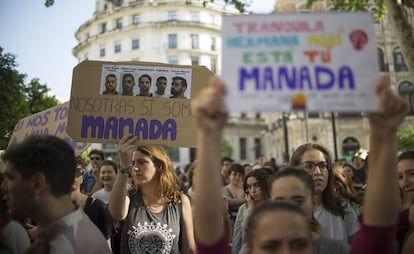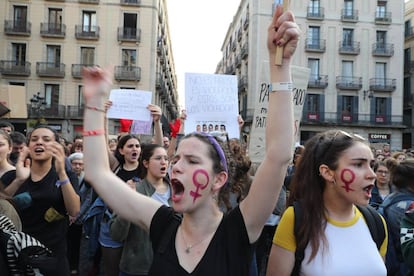Spain’s other “wolf packs” – what is driving gang rape culture?
Experts cite growing exposure to violent pornography at a young age as one of the determining factors in the increase in group assaults

Five men between the ages of 45 and 50 abuse a woman on a nudist beach in Cullera; a 14-year-old and his 22-year-old friend rape a 14-year-old girl at a party in San Fernando de Henares, Madrid; six young men, three of them minors, forcibly penetrate a 12-year-old girl in an abandoned seniors’ residence in Azuqueca de Henares in Guadalajara.
The list could go on to include all 104 cases of group assaults that have been compiled by the Sexual Geoviolence website since 2016, when an 18-year-old was raped at the Running of the Bulls fiestas in Pamplona by a group of five friends who went by the name of “La Manada,” or the Wolf Pack.
There is a growing amount of increasingly violent porn, and it is being watched earlier
Lluis Ballester, Balearic Islands University
So are there more wolf packs nowadays, or are they simply more visible? And why do gang rapes happen at all?
The first thing that experts point to on the issue is the growing consumption of pornography at an increasingly young age. But they also cite a number of other reasons, such as teenagers’ impulsive behavior and lack of awareness of risk, the normalization of erotic violence typical in the sex industry, the need to belong to a group, the inability to deal with frustration, and a lack of sexual education. All of this, they explain, “amplified by a sexist society.”
There are no official figures to fall back on, as the Spanish authorities do not gather data specific to sex crimes committed in gangs, so the Feminicidio.net project has compiled information based on cases reported in the media.
In 2016, the website recorded 17 cases, in 2017 there were 14, 59 in 2018 and 14 in 2019 so far. In recent years, they detected at least 356 sexual abusers, of whom 87 (24.4%) were minors “and accustomed to watching porn,” says Lluís Ballester, professor of Methods of Research in Education at the Balearic Islands University, and co-director of recent research into the link between pornography and adolescent personal relationships. This study puts the average age for watching porn at 14 for boys and 16 for girls, with some consumers starting as young as eight.

“There is a growing amount of increasingly violent porn, and it is being watched earlier,” says Ballester. “This produces a moral disconnect in some people, a shut-down produced by desensitization to a practice [gang rape] that allows for the recovery of a more primitive tribal link, typical of exhibitionist sexuality – you have to show it being done.” This is a relatively new element of gang rape and abuse, and is directly related to the extensive use of smartphones.
According to Martha Zein, a journalist, writer and expert on gender and sexuality, there is a new model of behavior, with young males “having gone from playing cowboys and Indians to being part of a ‘wolf pack’.” Zein says that youngsters actually imagine they are starring in a porn movie, and behave accordingly. “But,” she adds, “at the heart of what they are doing is a show of poorly understood power and a total lack of empathy.”
Zein goes on to explain that if you throw an inability to deal with frustration into the mix, and the ongoing narrative of desire as the driving force in life and the importance of satisfying sexual urges, you are left with a ticking time bomb.
Currently, one of the most popular videos on the internet, with more than 220 million views worldwide, is of a gang rape using extreme violence during which the girl cries, screams and begs repeatedly to be released. None of her aggressors heed her pleas. The men shake, pull and push her as though she was a piece of meat.
Rise in sex-crime reports
Rape reports in Spain increased by 22.7% in 2018: there were 1,702 rapes reported last year compared to 1,387 in 2017. Sexual abuse without penetration also rose by 17.5% – 12,109 in 2018 against 10,305 in 2017.
Reports of crimes against sexual liberty and integrity experienced the biggest rise of all crime reports last year – 18.1% –according to the Interior Ministry, ahead of kidnappings (17.4%) and drug trafficking (9%), with most cases being reported in Catalonia (2,598), Andalusia (2,348) and Madrid (2,017).
According to Bárbara Zorrilla, a psychologist specializing in gender violence, “responsibility is diluted in a group and [the aggressors] feel a sense of legitimacy in subduing someone using pain; it reinforces their self-esteem and they feel the praise of their companions, as though it were a feat.”
Zorrilla adds that the developmental stages typical to adolescents also need to be taken into account, such as little awareness of risk, impulsive tendencies and a feeling of invulnerability as well as gender-based socialization. “Current sexual education is confined to the difference in male and female biology and the use of condoms, but there is nothing about sex,” she says. “So how do they educate themselves in this area? With porn, and so you are back to square one…”
Núria González, a lawyer and president of the feminist association L’Escola, talks about the normalization of violence: the devaluation of women and the treatment of a woman as an object, thereby blurring the criminal element. “This ends up seeming normal in a world where the traditional family is disappearing and we have not been savvy about applying the positive values associated with that to other areas,” she says. “They are looking to reassert themselves while they consume violence 24/7, and there is no education to counter this dreadful situation.”
Pornography, is, according to González, a school for rape. “And there is nothing around that helps,” she says. “There is nothing but a political and social vacuum. We need political will and investment in education to foment equality and social awareness. It’s the same old story.”
English version by Heather Galloway.
Tu suscripción se está usando en otro dispositivo
¿Quieres añadir otro usuario a tu suscripción?
Si continúas leyendo en este dispositivo, no se podrá leer en el otro.
FlechaTu suscripción se está usando en otro dispositivo y solo puedes acceder a EL PAÍS desde un dispositivo a la vez.
Si quieres compartir tu cuenta, cambia tu suscripción a la modalidad Premium, así podrás añadir otro usuario. Cada uno accederá con su propia cuenta de email, lo que os permitirá personalizar vuestra experiencia en EL PAÍS.
¿Tienes una suscripción de empresa? Accede aquí para contratar más cuentas.
En el caso de no saber quién está usando tu cuenta, te recomendamos cambiar tu contraseña aquí.
Si decides continuar compartiendo tu cuenta, este mensaje se mostrará en tu dispositivo y en el de la otra persona que está usando tu cuenta de forma indefinida, afectando a tu experiencia de lectura. Puedes consultar aquí los términos y condiciones de la suscripción digital.









































